M. Allen Cunningham's Blog, page 10
May 2, 2018
American Book Review
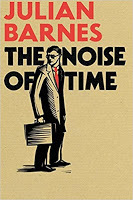 I'm pleased to contribute a review of Julian Barnes' novel The Noise of Time to the new issue of American Book Review. My review appears in the special section on biographical fiction guest edited by Michael Lackey.
I'm pleased to contribute a review of Julian Barnes' novel The Noise of Time to the new issue of American Book Review. My review appears in the special section on biographical fiction guest edited by Michael Lackey.A snippet:
There survive a few minutes of film footage from 1974 Leningrad. Dmitri Shostakovich, 68 years old—his pale, nerve-wracked face sunken behind bulky black glasses—watches a rehearsal of his opera “The Nose,” a work suppressed in Soviet Russia for nearly half a century. He is a man aged beyond his own years (and he will be dead within twelve months). The camera holds him in close-up. Off-screen, the orchestra plays, the singers sing out, while the music—the inflection of every note—trembles visibly across the composer’s face. He shifts in his seat but the camera clings to him. His mouth and chin quiver uncontrollably. The tendons seem to spasm in his neck. He’s agitated, at points almost gasping. He’s in agony. He’s awash in pleasure. His eyes, hooded for decades and no longer capable of shedding tears, never leave the stage. Finally, finally, this music has its freedom—but Shostakovich the man and artist has never been free.Reverse the footage. Watch it again. Is this the image of one soul’s tragedy, or its consolation? Has the poor man triumphed at last, or is there some level of suffering beyond which no triumph is possible? In The Noise of Time, his new biographical novel of Shostakovich, Julian Barnes takes up questions like these.
Published on May 02, 2018 16:41
March 7, 2018
From the Archives: William H. Gass on Rilke
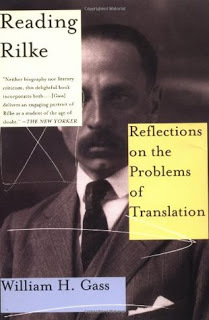
Here's the audio of a fascinating conversation about Rainer Maria Rilke, with KCRW's "Bookworm" host Michael Silverblatt and American novelist William H. Gass, author of Omensetter's Luck. Gass discusses his nonfiction work Reading Rilke . The discussion was recorded in 2004. I wouldn't put Rilke's art in the crass, somewhat oversimplified biographical terms that Gass sometimes does, but it's great fun to listen in as he and Silverblatt talk about Rilke's life and work.
A snippet:
Gass: [Rilke] is trying to do something in one sense impossible, and that is to make a verbal object into a thing. And Rodin is teaching him--not only to make works of art from the ontological view, from the point of view of creating being and placing it in the world as solidly as a statue -- but also to give it a kind of almost impressionistic, multilayered, multisurfaced effect
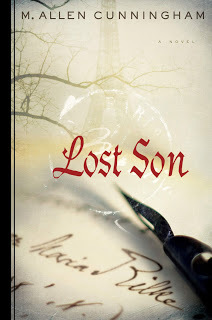 that Rodin was getting in his sculpture. But it is also, of course, for Rilke an enormously important time psychologically, because The Notebooks of Malte Laurids Brigge is to write about a failed poet. And Rilke is seeing himself for the first time as a failure, as someone who is risking a failure, and while he's courting, in order to stay alive (he's getting paid for this monograph on Rodin) -- he's courting genius, success, overwhelming success that Rodin is enjoying at this time. Moreover, Rodin is in a sense, from [Rilke's] point of view, coarse, sexually on the rampage... And there's this little Lord Fauntleroy type watching all this, who then goes back to a little squalid room in Paris and can hardly make ends meet, and who is also feeling an enormous amount of guilt, because he has in effect left his wife and small child. It's a mess. And that very mess is something that Rilke was able to make a capital of.
that Rodin was getting in his sculpture. But it is also, of course, for Rilke an enormously important time psychologically, because The Notebooks of Malte Laurids Brigge is to write about a failed poet. And Rilke is seeing himself for the first time as a failure, as someone who is risking a failure, and while he's courting, in order to stay alive (he's getting paid for this monograph on Rodin) -- he's courting genius, success, overwhelming success that Rodin is enjoying at this time. Moreover, Rodin is in a sense, from [Rilke's] point of view, coarse, sexually on the rampage... And there's this little Lord Fauntleroy type watching all this, who then goes back to a little squalid room in Paris and can hardly make ends meet, and who is also feeling an enormous amount of guilt, because he has in effect left his wife and small child. It's a mess. And that very mess is something that Rilke was able to make a capital of.And here's a little bit from Lost Son dealing with these same critical Paris days in Rilke's life. The poet is standing before Notre Dame Cathedral at twilight:
"The cathedral is perhaps the greatest of all this city's things, and it unifies all that surrounds it...What beautiful power it is that this Notre Dame in its grand thingness can take such discordant elements and draw them all into a pure harmonic. Rodin's body of work has a similar power: his sculpture seems to have gathered everything, everything into itself. And Rainer wonders now: How may a poet acquire such ingathering power? How not merely understand the power but acquire it? How construct as the Master does?
Rainer knows he's nothing like Rodin--no sculptor, no craftsman. Enormous hunks of stone arrive frequently at Meudon. The Master orders the stones set down on the lawn that he may circle them with his thoughtful topheavy stride, his hand wandering in his beard. The poet has watched his eyes and seen the visions kindling there. In blocks of intransigent stone, fragments of mountains that move only with the strength of several men, Rodin gratefully receives the heaviness of his work.
Rainer, though, is no sculptor. By what handcraft, then, could he possibly make work of this city's things? -- of this city's fear, even, which stands three-dimensional amongst the things? The fear, he sees now, could be a unifying power should one muster the strength to make it such. But what immeasurable quantities of strength would be required? How might he get outside himself and make of himself a hand to grasp Paris and everything Paris stirs up inside? -- to give it all a form, a shape?"
This post originally appeared on this blog on June 25, 2007.
Published on March 07, 2018 10:04
January 20, 2018
New Novel Arrives September, 2018. Pre-Orders Open Now.

Learn more / pre-order HERE
The Jacket Says:
The author of the much acclaimed #1 Indie Next Pick The Green Age of Asher Witherow returns with a riveting historical mystery about a family shaped as much by tumultuous world events as by each of its members' unspoken decisions.
Epic in scope and yet intimate in its emotional power, Perpetua's Kin moves across several generations and much of North America, from Pennsylvania and Iowa in the 1820s, through an American south embroiled in the Civil War, and finally to World War II San Francisco. What emerges is a profoundly contemporary exploration of the American experience as one family embodies it: our heritage of violence, our chronic restlessness and desire for regeneration through technology, and the impossibility of escaping the history that forms us and, always, demands a reckoning.
Early Readers Say:
“With Perpetua's Kin, M. Allen Cunningham once again demonstrates he is one of the bravest and most talented novelists writing today.His prose sings with a rare kind of poetry, even as the story sweeps you along with its dark mystery and heartbreaking tension. With each page we gain the greatest gift of fiction: an insight into our own trembling humanity. into our own trembling humanity.”
-Eowyn Ivey, author of To the Bright Edge of the World
and The Snow Child, Pulitzer Prize Finalist
“A novel in conversation with Faulkner and Melville and possibly even Robert Louis Stevenson. … A writer both original and well aware of the writers who have come before him. Cunningham’s writing, like the scope of his novel, is bold and ambitious.”
-Peter Turchi, author of A Muse and a Maze, and judge for the Oregon Literary Fellowship
"Perpetua's Kin is beautiful, reminiscent of The Green Age of Asher Witherow in that it has the cadence I remember that takes the reader right in ... M. Allen Cunningham gives us a book to savor -- a fulfilling, substantial book, and a joy to read."
-Janet Boreta, founder of Orinda Books (CA)
Published on January 20, 2018 12:29
January 7, 2018
Unconventional & Essential: David Thomson's Television: A Biography
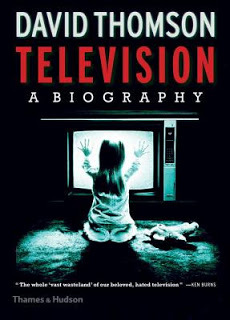 More than a year ago I first read film critic David Thomson’s large new book Television: A Biography. Since then I've returned to its pages often, reveling in Thomson's essential insights and savoring his unconventional approach to his subject. Far from being a dry historical account, a cerebral work of cultural theory or sociological documentation, or a fluffy entertainment chronicle, Thomson’s tome is a remarkably free-spirited (and freewheeling) series of reflective essays on the cultural, existential, and psychic impact of that problematic household fixture: the small screen.
More than a year ago I first read film critic David Thomson’s large new book Television: A Biography. Since then I've returned to its pages often, reveling in Thomson's essential insights and savoring his unconventional approach to his subject. Far from being a dry historical account, a cerebral work of cultural theory or sociological documentation, or a fluffy entertainment chronicle, Thomson’s tome is a remarkably free-spirited (and freewheeling) series of reflective essays on the cultural, existential, and psychic impact of that problematic household fixture: the small screen.Chronology, thankfully, is out the window here. Instead of a banal blow-by-blow of television’s development from the 1930s onward, Thomson lets the theme of his thoughts be the guide. He riffs, and his riffs cover just about everything interesting, disturbing, and outright surreal relating to this taken-for-granted medium: the TV as precursor of the ubiquitous and entrancing handheld screen; the fallacious nature of TV ratings systems; the subliminal polarities of 1) The Fugitive, which extolled chameleon-like freedom and the excitement of being on the run, and 2) The Donna Reed Show, which extolled domesticity while hinting at the eroticism underlying suburban decency; the behind-the-scenes marital dysfunction of Lucy and Desi; our Pavlovian consent to the eternal “on-ness” of the tube; the mesmerism of the laugh-track; the lethal constancy of commercials and the failure of Mad Men, as an ad-supported show on an ad-dependent network, to live up to its own potential; the sweet depressive allure of “channel-surfing”; the “Gong Show” as a postmodern theater; and on and on. He’s a fantastically intelligent and appealingly “fizzy” writer, and many of his observations here hearken to Neil Postman in Amusing Ourselves to Death or Marshall McLuhan in The Medium Is the Massage .
“The medium had another role,” Thomson writes, “all the more powerful because it was never intended or organized: It promoted the principle that it was sufficient for the world to be witnessed, or to have it pass by. It did not require the effort of understanding or criticism. Its ‘on-ness’ was paramount, just as our participation began to be offset. This was a new solitude, not just that of living alone: You could be in a crowd, but you might not matter.”
A little further on, he writes: “You know this is true: Television is not for attention; the ads trained us in not watching. … The mainstream of the medium clung to the idea that everyone can understand everything — but that can slip into the delusion that no one needs to understand anything.” And Thomson ties together the generational overrating of screen media -- first in our passive fixation upon the original living room screen, and now in today’s obsessive fixation on handheld screens: “Television wasn’t just an elephant in the room. It became the room, the house, and the world. … The deepest nature of television is to be reassuring. That may be the most frightening thing about it… our making our way by watching screens, or by having them on, hardly aware of how the television screen has trained us for the computer screen, the iPad, the iPhone, or the iI (coming so soon I wish I had invested), and the assumption that because information is carried in those ways so knowledge must exist there.”
Published on January 07, 2018 11:53
December 6, 2017
New Novel Perpetua's Kin Will Appear in 2018
Begun back in 2007, my novel Perpetua's Kin will finally see the light of day in 2018.
Have a listen to an audio excerpt, and read some nice things that have been said about the book HERE.
Listen to "Perpetua's Kin: The Harvest Taught Him" on Spreaker.
Have a listen to an audio excerpt, and read some nice things that have been said about the book HERE.
Listen to "Perpetua's Kin: The Harvest Taught Him" on Spreaker.
Published on December 06, 2017 16:11
August 6, 2017
Ali Smith & the Art of Novelizing Now
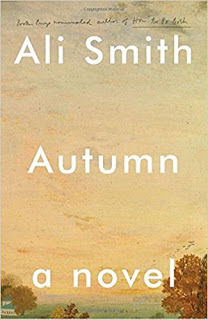 Ali Smith’s new novel
Autumn
has remained in my thoughts in the weeks since I finished it. I’ve been following Smith’s output since her 2012 book
Artful
, which is a vital and unclassifiable work of narrative, literary reflection, and aesthetic philosophy that I return to frequently. To read Smith is to read a reader as much as a writer — or to read the readerly imagination in action: her work demonstrates the symbiotic nature of literary appreciation (or better, osmosis), emulation, and outright invention. Her books are as transparently and blatantly inspired as they are infectiously inspiring. They make you want to read more, and with greater curiosity; they make you want to write more, and with greater freedom and immediacy.
Ali Smith’s new novel
Autumn
has remained in my thoughts in the weeks since I finished it. I’ve been following Smith’s output since her 2012 book
Artful
, which is a vital and unclassifiable work of narrative, literary reflection, and aesthetic philosophy that I return to frequently. To read Smith is to read a reader as much as a writer — or to read the readerly imagination in action: her work demonstrates the symbiotic nature of literary appreciation (or better, osmosis), emulation, and outright invention. Her books are as transparently and blatantly inspired as they are infectiously inspiring. They make you want to read more, and with greater curiosity; they make you want to write more, and with greater freedom and immediacy.Autumn, a fairly short novel printed in fairly large type, is pleasurable in no small part because of the swiftness with which the reader turns its pages. It’s a book I’m sure I will re-read soon, but as I continue to think about my first swift experience of Autumn, what fires my imagination is the work’s incredible promptness (“timeliness” would be too weak a descriptor). This must be Europe’s first “Brexit novel.” Although I’d hate to see it reduced to mere topicality (its themes and concerns, like in all of Smith’s work, are vast), the fact that Autumnhandles — and handles with such emotional and existential deftness — an event so recent, is a kind of literary/artistic miracle. Here’s a book — a genuinely beautiful, mournful, philosophical, emotionally awake book — that responds with alert sensitivity to our now, and does so through a narrative set squarely inour now, rather than by relying on a historical setting, political hindsight, a retrospective narrative framework, metaphor, or synecdoche. And yet also, much as in her other books, Smith’s literary allusiveness, her delightful readerly intelligence, is at work here in every part.
Autumn opens with the words: “It was the worst of times, it was the worst of times. Again. That’s the thing about things. They fall apart, always have, always will, it’s in their nature.” Later on, in a perfect distillation of this novel’s profound immediacy, Smith writes:
“All across the country, there was misery and rejoicing. All across the country, what had happened whipped about by itself as if a live electric wire had snapped off a pylon in a storm and was whipping about in the air above the trees, the roof, the traffic. All across the country, people felt it was the wrong thing. All across the country, people felt it was the right thing. All across the country, people felt they’d really lost. All across the country, people felt they’d really won. All across the country, people felt they’d done the right thing and other people had done the wrong thing. All across the country, people looked up Google: what is EU? All across the country, people looked up Google: move to Scotland. All across the country, people looked up Google: Irish passport applications. All across the country, people called each other cunts. All across the country, people felt unsafe. All across the country, people were laughing their heads off. All across the country, people felt legitimized. All across the country, people felt bereaved and shocked. All across the country, people felt righteous. All across the country, people felt sick. All across the country, people felt history at their shoulder. All across the country, people felt history meant nothing. …”
This passage continues, and constitutes a 3-page stand-alone chapter. This is literature that is alive and resonant and reckoning with lived experience. Smith is documenting, inhabiting, reporting on, existentially novelizing a crucial present moment that will, as we all can sense so clearly, become a signal historical moment whose lasting consequences, though we can only predict them while in the thick of our now, will be plain to see from the future.
How astounding — astounding and instructive — to watch literature at work in this way.
Published on August 06, 2017 13:45
April 27, 2017
Words in Themselves: A Letter to the New York Times Book Review
April 19th, 2017
To the New York Times Book Review,
In her review of Brian Doyle’s novel about Robert Louis Stevenson, The Adventures of John Carson in Several Quarters of the World (April 14th), Jenny Davidson uses the phrase “abuse of the dictionary” to deride Doyle’s stylistic choices. It’s funny that Davidson’s jab should involve reference to a bound volume of meanings, for “abuse of the dictionary” has hardly any meaning at all. I don’t think she’s saying that Doyle burned his dictionary, or tore it up, or stabbed holes in it with a sword, or threw it at someone, or used it in some other perverse physical way. If Davidson’s phrase is meant as a quip, it’s an oddly joyless one — especially when aimed at a fellow writer whose medium is, well, words. She swipes at Doyle for daring to perpetuate Stevenson’s dictional excess (i.e., permitting “perspicacity,” “assiduously,” and “parsimonious” to occupy a single sentence). She seems to be alleging that Doyle has shamelessly, joyfully deployed vocabulary. Maybe Doyle did look to a dictionary, or maybe he just relied on the lexical databank in his own head, but why should a writer be held under suspicion of using a reference book that is a tool and inspiration for those who live and work in words?
Davidson’s professed annoyance raises questions about dogmatic attitudes and perceived mandates in book reviewing. For example: where’s the statute, in New York or anywhere, against a writer’s exuberant love of language? And why do we insist, every season or so, on forgetting that the finest writers have always been, as Cynthia Ozick noted, besotted with words, words in themselves? Stevenson was among these, and if Doyle is besotted too, may the great ghosts of literature bless him.
—M. Allen CunninghamPortland, Oregon
To the New York Times Book Review,
In her review of Brian Doyle’s novel about Robert Louis Stevenson, The Adventures of John Carson in Several Quarters of the World (April 14th), Jenny Davidson uses the phrase “abuse of the dictionary” to deride Doyle’s stylistic choices. It’s funny that Davidson’s jab should involve reference to a bound volume of meanings, for “abuse of the dictionary” has hardly any meaning at all. I don’t think she’s saying that Doyle burned his dictionary, or tore it up, or stabbed holes in it with a sword, or threw it at someone, or used it in some other perverse physical way. If Davidson’s phrase is meant as a quip, it’s an oddly joyless one — especially when aimed at a fellow writer whose medium is, well, words. She swipes at Doyle for daring to perpetuate Stevenson’s dictional excess (i.e., permitting “perspicacity,” “assiduously,” and “parsimonious” to occupy a single sentence). She seems to be alleging that Doyle has shamelessly, joyfully deployed vocabulary. Maybe Doyle did look to a dictionary, or maybe he just relied on the lexical databank in his own head, but why should a writer be held under suspicion of using a reference book that is a tool and inspiration for those who live and work in words?
Davidson’s professed annoyance raises questions about dogmatic attitudes and perceived mandates in book reviewing. For example: where’s the statute, in New York or anywhere, against a writer’s exuberant love of language? And why do we insist, every season or so, on forgetting that the finest writers have always been, as Cynthia Ozick noted, besotted with words, words in themselves? Stevenson was among these, and if Doyle is besotted too, may the great ghosts of literature bless him.
—M. Allen CunninghamPortland, Oregon
Published on April 27, 2017 16:37
January 7, 2017
Always, John: In Memoriam John Berger 1926-2017
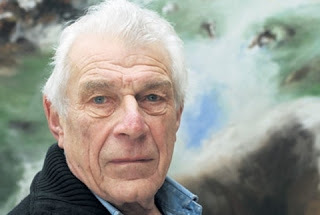 Photo: The Guardian “A presence, a visible presence, is sometimes most eloquently conveyed by a disappearance.”— John Berger
Photo: The Guardian “A presence, a visible presence, is sometimes most eloquently conveyed by a disappearance.”— John Berger
In the spring of 2015, by the good graces of mutual friends, a small parcel traveled from my home in Portland, Oregon to John Berger’s home in France. Included in the parcel was a brief letter:
“Because I have read, admired, and drawn immense inspiration from your work for many years now, I feel I have simply too much to say to you — and hardly know where to start — so I will let the enclosed book do the saying, mostly. … There are some few glistening gossamer threads linking this work to yours. Without those strong fibers, I’m not sure the book would ever have been imagined.”
That book was Partisans, a philosophical novel in which Janos Lavin, the main character from John’s own debut novel A Painter of Our Time (1959), is referenced as a real artist. But that’s just one point of connection. John’s body of work inspires Partisans throughout and I wanted him to know this. Since I’d published Partisans myself in samizdat fashion — there would be no promotion and no reviews — he would only know if I told him.
At first I wasn’t sure how to address my letter. We’d never met, but “Mr. Berger” wasn’t right, nor was “Dear John.” After much thought, I settled on “Dear John Berger.” It felt most natural, finally, to rely on the name’s printed incarnation, the name as it appeared in all those books I’d been reading for so long.
John’s reply arrived a few weeks later, a handwritten note in a small white envelope. He’d signed himself “Always, John.” That’s how I think of him now, so that’s how I write of him here.
Continue Reading "Aways, John" HERE
Published on January 07, 2017 13:09
November 18, 2016
Cunningham's Funny-Ass Thoreau Featured on Lit Hub
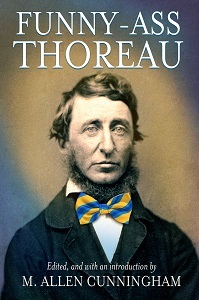 Coinciding with the release of the newest Atelier26 title
Funny-Ass Thoreau
, edited by M. Allen Cunningham,
Lit Hub is featuring Cunningham's full introduction to the book
.
Coinciding with the release of the newest Atelier26 title
Funny-Ass Thoreau
, edited by M. Allen Cunningham,
Lit Hub is featuring Cunningham's full introduction to the book
.Here's a snippet:
When I was fourteen my mother, exasperated by the onset of my teenage angst, handed me a Penguin paperback of Thoreau’s Walden and said, “Read this. The guy who wrote it was a rebel like you.” For some reason, I did as she suggested, and in Walden’s transcendental rants I found all my angsty teenage convictions gloriously and authoritatively ratified. Institutions were bad: they wanted to straitjacket my thoughts and crush my creativity; my elders were either corrupt or absent-mindedly hypocritical, either tyrannical or brainwashed, tragic or just pitiful; the dictates of fashion and good form were stifling and almost always ridiculous; money was a golden calf, prosperity overrated, and “making a good living” was a fool’s errand; as for our so-called government, it was just one big immoral business. ...
For me, Thoreau’s writing was a drug. It knocked my neurons around. It worked me over completely, induced a sort of insanity, and actually changed the course of my life forever. And still, until quite recently, I did not get the jokes. Had you taken the pains to point out to me, at fourteen, the extent of the levity that permeates Walden and much of Thoreau’s writing, I might have punched you in the nose. ...Visit Lit Hub to read the rest .
And get your copy of Funny-Ass Thoreau right here , or ask for it at your neighborhood bookseller .
Published on November 18, 2016 20:59
November 9, 2016
November 9, 2016
Reality television wins. But we can resist. We can resist quietly, steadfastly, everyday. In our loving, our art-making, our communities.— M. Allen Cunningham (@M_A_Cunningham) November 9, 2016
Published on November 09, 2016 10:11



